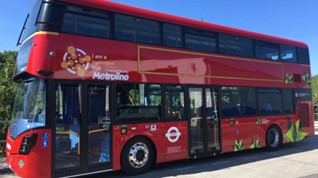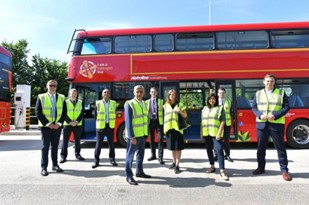- Country: United Kingdom
- Sector: Buses
- Area of Action: Urban transport
- Type of service: Municipality/public service
- Power source: Hidrogen
- Aspects described in the case study:
- Technical features of e-buses and actual developments
- Charging infrastructure construction and operation
- Digital solutions assisting the use and operation of e-buses
- Training of e-bus drivers
- Training of e-bus maintenance staff
- Eco driving
- Health and business environment of e-bus driving
CONTEXT
The London hydrogen bus project is being implemented in a densely populated city known for its heavy traffic and environmental challenges. This project, led by Transport for London (TfL) and supported by European initiatives such as JIVE, introduced the first hydrogen double-decker buses in England. These vehicles emit no pollutants and only produce water as a by-product, making a significant contribution to improving air quality. The initiative is part of a larger effort to achieve a fully zero-emission bus fleet by 2030, benefiting both public health and the local economy.

THE PROCESS
- Planning and investment: Planning for the London hydrogen bus project involved collaboration between Transport for London (TfL), the Department of Energy and Climate Change, and the European Union through projects such as JIVE and MEHRLIN. Preliminary studies and pilot tests were carried out to assess the feasibility and benefits of hydrogen technology. The initial investment was considerable, with more than £300 million spent on transforming the bus fleet and establishing adequate infrastructure.
- Infrastructure development: The necessary infrastructure includes hydrogen refuelling stations, which can refuel a bus in five minutes. These stations were strategically located to maximise operational efficiency and facilitate maintenance. In addition, specialised centres were developed for the repair and maintenance of these advanced vehicles.
- Technology integration: Hydrogen buses were designed with advanced technologies to ensure efficiency and comfort. This includes state-of-the-art hydrogen propulsion systems, USB chargers, comfortable seats, and an optimised interior design for a better user experience. In addition, real-time information systems were integrated to improve communication with passengers.
- Training programs: TfL personnel, including drivers and maintenance technicians, received specialised training in the operation and maintenance of the new hydrogen buses. This training was crucial to ensure the safe and efficient operation of the vehicles, as well as to maximise their useful life.
- Awareness campaigns: To increase public acceptance and knowledge of the benefits of hydrogen, awareness campaigns were conducted. These campaigns informed citizens about emission reductions and public health benefits, encouraging a positive change in the perception and use of public transportation.

IMPACT
- Environmental benefits: The transition to hydrogen buses has significantly reduced emissions of CO2 and other pollutants, improving air quality in London. This has contributed to the city’s targets of reducing total carbon emissions by 60% by 2025.
- Operational efficiency: Hydrogen buses have proven to be highly efficient in operational terms, with fast refuelling times and greater range compared to other clean technologies. This has allowed for smoother operation and fewer service interruptions.
- Public health: Improved air quality has had a positive impact on public health, reducing the incidence of respiratory and cardiovascular disease among London residents. This has been especially beneficial for vulnerable populations such as children and the elderly.
- Economic growth: The implementation of hydrogen buses has generated employment in sectors such as manufacturing and vehicle maintenance, boosting the local economy. It has also fostered innovation and technological development in the transportation sector.
- Training and skills development: The training programs implemented have significantly improved the technical skills of TfL staff. This has not only improved operational efficiency but also prepared employees for future technologies in sustainable transport.
MORE INFORMATION
For more information, it is relevant to note that the London hydrogen bus project aligns with the city’s environmental objectives, such as achieving net zero carbon emissions by 2030. This initiative is supported by local policies and European funding programs such as Clean Hydrogen JU and CINEA. Challenges included high initial investment and the need for advanced refuelling infrastructure. However, they were mitigated through international collaborations and significant government support. The project also highlights the importance of public-private partnerships in driving sustainable urban transport solutions.
MULTIMEDIA
Sources:
https://ichef.bbci.co.uk/news/976/cpsprodpb/AA0D/production/_119033534_buspic.jpg
https://pbs.twimg.com/media/ERUYF2mXkAEI24F?format=jpg&name=4096×4096
Videos:
Relevant links:
